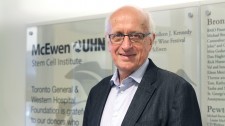The 2019 Ogawa-Yamanaka Stem Cell Prize Awarded to Gordon Keller

SAN FRANCISCO, July 31, 2019 (Newswire.com) - Gordon Keller, Ph.D., was announced today as the recipient of the 2019 Ogawa-Yamanaka Stem Cell Prize by the Gladstone Institutes. Keller is the director of the McEwen Stem Cell Institute at the University Health Network in Toronto, Canada, as well as a senior scientist at Princess Margaret Cancer Centre and a professor in the Department of Medical Biophysics at the University of Toronto.
A world-renowned stem cell scientist, Keller was selected for his contributions to efficient lineage-specific differentiation of human pluripotent stem cells into a myriad of cell types, enabling disease modeling and regenerative medicine approaches for many human diseases.
“I’m very pleased that Gordon is the recipient of this year’s prize,” said Shinya Yamanaka, MD, Ph.D., senior investigator at Gladstone who received the Nobel Prize for his discovery of induced pluripotent stem cells. “His work has been essential for many scientists around the world, as he showed us how to differentiate stem cells into other cell types.”
To honor Yamanaka’s important discovery, the Ogawa-Yamanaka Stem Cell Prize was established in 2015 by a generous gift from the late Hiro and Betty Ogawa. By creating this award, the Ogawa family sought to motivate and support individual scientists or doctors conducting groundbreaking work in translational regenerative medicine using reprogrammed cells. The prize is supported by the Gladstone Institutes and the Cell Press group.
“It is a privilege and honor to receive the distinguished Ogawa-Yamanaka prize for my work on the directed differentiation of pluripotent stem cells,” said Keller, who is also a founding board member of the International Society of Stem Cell Research. “I am fortunate to have had the opportunity to work in the field of stem cell biology for most of my career and to contribute to the translation of this science to the development of new therapies to treat human disease.”
Keller was selected by an independent committee of international stem cell experts from a highly competitive pool of nominees. A ceremony will be held on November 6, 2019, at the Gladstone Institutes in San Francisco, California, during which Keller will give a scientific lecture and will be presented with the award, along with an unrestricted prize of $150,000 USD.
Register in advance to view the lecture and ceremony streamed live on Gladstone’s website, Facebook page, and YouTube channel.
“We are honored to host one of the biggest stem cell prizes in the world, which we hope will motivate scientists to advance their stem cell discoveries with urgency to address humankind’s most devastating diseases,” said Gladstone President Deepak Srivastava, MD, chair of the selection committee and director of the Roddenberry Stem Cell Center at Gladstone.
###
About Gordon Keller
Gordon Keller, Ph.D., is the director of the McEwen Stem Cell Institute at the University Health Network in Toronto, Canada. He is also a senior scientist at Princess Margaret Cancer Centre and a professor in the Department of Medical Biophysics at the University of Toronto. Keller is the premier researcher in the application of developmental biology–guided principles to the differentiation of pluripotent stem cells into therapeutically relevant cells, such as cardiomyocytes, hematopoietic cells, and liver cells.
Keller earned his Ph.D. in immunology at the University of Alberta and completed a postdoctoral fellowship at the Ontario Cancer Institute in Toronto. After working at the Basel Institute for Immunology in Switzerland, he became a visiting scientist at the Research Institute of Molecular Pathology in Vienna, Austria. Keller moved to the United States in 1990, working initially at the National Jewish Centre for Immunology and Respiratory Medicine in Colorado, then at the Mt. Sinai School of Medicine in New York, where he was appointed director of the Black Family Stem Cell Institute in 2005. In 2007, Keller returned to Canada to take on his current position.
Keller was a founding board member of the International Society of Stem Cell Research. In December 2016, he was named scientific co-founder of BlueRock Therapeutics, a next-generation regenerative medicine company.
About the Ogawa-Yamanaka Stem Cell Prize
The Ogawa-Yamanaka Stem Cell Prize recognizes individuals whose original translational research has advanced cellular reprogramming technology for regenerative medicine. Supported by the Gladstone Institutes, the prize was established in 2015 through a generous gift from the late Betty and Hiro Ogawa and has been maintained through their sons, Andrew and Marcus Ogawa. It honors the Ogawas’ memory by continuing the philanthropic legacy they shared during their 46-year marriage. It also recognizes the importance of induced pluripotent stem cells (iPSCs), discovered by Gladstone Senior Investigator and Nobel laureate Shinya Yamanaka, MD, Ph.D. This year, Gladstone formed a partnership with the Cell Press group to support this important prize.
Past recipients include Masayo Takahashi, MD, Ph.D., in 2015; Douglas Melton, Ph.D., in 2016; Lorenz Studer, MD, in 2017; and Marius Wernig, MD, Ph.D., in 2018.
The 2019 selection committee was composed of George Daley, MD, Ph.D., dean of Harvard Medical School; Hideyuki Okano, MD, Ph.D., dean of the School of Medicine at Keio University; Deepak Srivastava, MD, president of the Gladstone Institutes, director of the Roddenberry Stem Cell Center at Gladstone, and president of the International Society for Stem Cell Research; Lorenz Studer, MD, director of the Center for Stem Cell Biology at Memorial Sloan Kettering Cancer Center; Fiona Watt, FRS, FMedSci, director of the Centre for Stem Cells and Regenerative Medicine at King’s College, London; and Shinya Yamanaka, MD, PhD, senior investigator at Gladstone and director of the Center for iPS Cell Research and Application at Kyoto University.
About the Gladstone Institutes
To ensure our work does the greatest good, Gladstone Institutes focuses on conditions with profound medical, economic, and social impact—unsolved diseases. Gladstone is an independent, nonprofit life science research organization that uses visionary science and technology to overcome disease. It has an academic affiliation with the University of California, San Francisco.
Source: Gladstone Institutes
